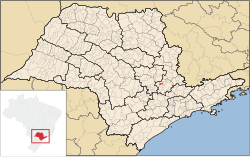Nova Odessa (literally "New Odesa") is a Brazilian municipality in the state of São Paulo. It is part of the Metropolitan Region of Campinas.[2] The population is 60,956 (2020 est.) in an area of 73.79 km2.[3] Nova Odessa was founded on May 24, 1905, by Carlos José de Arruda Botelho, Secretary of Agriculture of the state of São Paulo, and then settled by Ukrainians and Latvians.
Nova Odessa | |
|---|---|
| Municipality of Nova Odessa | |
 Location in São Paulo state | |
| Coordinates: 22°46′48″S 47°17′56″W / 22.78000°S 47.29889°W | |
| Country | |
| Region | Southeast |
| State | |
| Metropolitan Region | Campinas |
| Founded | 24 May 1905 |
| Area | |
• Total | 73.79 km2 (28.49 sq mi) |
| Elevation | 570 m (1,870 ft) |
| Population (2020 [1]) | |
• Total | 60,956 |
| • Density | 830/km2 (2,100/sq mi) |
| Time zone | UTC−3 (BRT) |
| Postal Code (CEP) | 13460-000 |
Its name is due to a visit Carlos Botelho made to the city of Odesa, Ukraine, from where he brought the style of its streets, and not because the first settlers were from there (as they were not).[4]
History
editIn the early 20th century, the area of present-day Nova Odessa was classified as an uninhabited land suitable for farming. On May 24, 1905, the Brazilian government founded Nova Odessa as a "Núcleo Colonial" (the "Colonial Nuclei" were agricultural areas to where the Brazilian government wished to attract European immigrants in large-scale).
The first settlers to arrive in the area were immigrants from Ukraine, but, not adapting to agriculture (one of the pointed reasons for this is that they were not farmers originally), most of them soon abandoned the colony and moved to larger Brazilian cities. In late 1905, only a few Ukrainian families had remained in the nucleus. Determined to consolidate the colony, the Brazilian government sent João Gutmann to Riga, capital of Latvia, with the goal of attracting farmers to the colony. In 1906, the place received the first settlers from Latvia, that were the responsible for the consolidation of the colony. Later, other Brazilian immigration agents were sent to Latvia and succeeded in attracting more families.[5]
Demographics
edit
| ||||||||||||||||||||||||||||||||||||||||
Culture
editThe city maintains or supports directly in several ways a wide range of departments, programs, groups and cultural institutions. Those include the Municipal Public Library (Biblioteca Pública Municipal Professor Antônio Fernandes Gonçalves) —that has a section of books in the Latvian language.[9] Although the city later received many people from other ethnicities, the Latvian Culture is still very noticeable and there are plans for the creation of a Center of Latvian Culture (Centro de Cultura Leta) there.[9]
Economy
editThe economy is based on industry, mainly textiles. The city's GDP went from R$373 million in 1999 to R$1.6 billion in 2009. With its per capita value reaching R$32,862 (2009 data) —double the national average.[10]
Media
editIn telecommunications, the city was served by Telecomunicações de São Paulo.[11] In July 1998, this company was acquired by Telefónica, which adopted the Vivo brand in 2012. The company is currently an operator of cell phones, fixed lines, internet (fiber optics/4G) and television (satellite and cable).[12]
Climate
editThe city has a highland tropical climate, semi-humid with dry winters.
| Nova Odessa | ||||||||||||||||||||||||||||||||||||||||||||||||||||||||||||
|---|---|---|---|---|---|---|---|---|---|---|---|---|---|---|---|---|---|---|---|---|---|---|---|---|---|---|---|---|---|---|---|---|---|---|---|---|---|---|---|---|---|---|---|---|---|---|---|---|---|---|---|---|---|---|---|---|---|---|---|---|
| Climate chart (explanation) | ||||||||||||||||||||||||||||||||||||||||||||||||||||||||||||
| ||||||||||||||||||||||||||||||||||||||||||||||||||||||||||||
| ||||||||||||||||||||||||||||||||||||||||||||||||||||||||||||
Religion
editChristianity is present in the city as follows:
Catholic Church
editThe Catholic church in the municipality is part of the Roman Catholic Diocese of Limeira.[13]
Protestant Church
editThe most diverse evangelical beliefs are present in the city, mainly Pentecostal, including the Assemblies of God in Brazil (the largest evangelical church in the country),[14][15] Christian Congregation in Brazil,[16] among others. These denominations are growing more and more throughout Brazil.
See also
editReferences
edit- ^ IBGE 2020
- ^ Região Metropolitana de Campinas
- ^ Instituto Brasileiro de Geografia e Estatística
- ^ "Prefeitura Municipal de Nova Odessa". www.novaodessa.sp.gov.br. Retrieved 2023-05-04.
e também fica esclarecido que nunca veio nenhum grupo de emigrantes da cidade de Odessa. (free translation: "and becomes also clarified that no group of immigrants ever came from the city of Odesa.")
- ^ novaodessa.sp.gov.br - História de Nova Odessa. (in Portuguese)
- ^ "Censos Demográficos (1991-2022) | IBGE". www.ibge.gov.br (in Portuguese).
- ^ "Censos Demográficos (1872-1980) | IBGE". biblioteca.ibge.gov.br (in Portuguese).
- ^ "Biblioteca Digital Seade | Fundação Seade". bibliotecadigital.seade.gov.br (in Portuguese).
- ^ a b novaodessa.sp.gov.br - Biblioteca de Nova Odessa recebe doação de mais de 150 títulos letos. (in Portuguese)
- ^ http://www.artguth.com - Nova Odessa. Economia quadruplicou em uma década. (in Portuguese)
- ^ "Creation of Telesp - April 12, 1973". www.imprensaoficial.com.br (in Portuguese). Retrieved 2024-06-14.
- ^ "Our History - Telefônica RI". Telefônica. Retrieved 2024-06-14.
- ^ "São Paulo (Archdiocese) [Catholic-Hierarchy]". www.catholic-hierarchy.org. Retrieved 2024-06-22.
- ^ "Campos Eclesiásticos". CONFRADESP (in Portuguese). 2018-12-10. Retrieved 2024-06-22.
- ^ "Arquivos: Locais". Assembleia de Deus Belém – Sede (in Portuguese). Retrieved 2024-06-22.
- ^ "Localidade - Congregação Cristã no Brasil". congregacaocristanobrasil.org.br (in Portuguese). Retrieved 2024-06-22.


